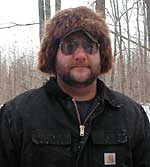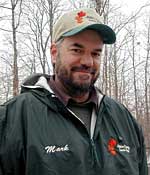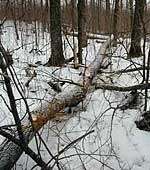By Stephanie Hemphill
Minnesota Public Radio
February 5, 2002
The Sierra Club's lawsuit alleging the U.S. Forest Service is managing its lands to produce aspen at the expense of re-growth of native hardwood forests is just the latest in a string of legal actions against the agency. Forest management is surprisingly controversial. Aitkin County is experimenting with a style of forest management that will likely please both environmentalists and the forest industry.
| |
|
|
|
||
Aitkin was the first county in the nation to have its lands certified as a well-managed forest. The certification is part of a conscious effort to encourage small, locally-based forest industries.
Joe Jewett is a good example of the new kind of entrepreneur the county is trying to encourage.
Jewett, in his 30s, is a solid man in a Carhartt jacket and a beaver skin hat. He likes to work alone in the woods. When his family quit their aspen logging business, he bought the smallest pieces of equipment his parents owned, and went into the woods by himself.
Standing on a logging road that runs through 40 acres of rolling hills in central Aitkin County, Jewett shows visitors stacks of logs. He's cut maple, basswood, and oak. Jewett says each tree goes to a different processor, depending on the size and quality of the wood.
"The high quality sawlogs are sold to a lumber mill," Jewett says. "The low quality sawlogs go to a pallet mill in McGregor, and the rest is firewood or pulpwood."
This is different from aspen logging, where the entire harvest goes to a single pulp or paper mill. Some of Jewett's higher quality basswood will be sawed into chunks for wood carvers. Some will be shipped to California or Arizona to be turned into venetian blinds. The oak might be milled for flooring, and the maple could turn up in cabinets.
Jewett has to find a market for each log. That requires time and attention. But each truckload brings more profit than a truckload of pulpwood.
| |
|
|
|
||
CARING FOR THE WOODS
The smaller scale and slower pace of his operation allow Jewett to get to know the woods as he works.
A couple of county foresters have stopped by to make sure Jewett is living up to his contract. He shows them a big old oak he cut down. About half the tree is rotten. Jewett says he knew it would be that way before he even cut it.
"It looked like it had been scarred a long time ago," he says. "And then there were big white mushrooms on it, so I knew what it was going to look like. It's just a big tree and it's shading all the smaller trees out."
The upper half is healthy and will make good lumber. Jewett plans to leave the rotten bottom half in the woods.
"Different birds will go in it, and it's pretty close to being hollow," he says, picking away at the punky wood with his fingernail. "Raccoons will hide in it, porcupines, that sort of thing. It's a habitat tree."
Jewett bought the stumpage, or the right to cut these trees, from Aitkin County. The county owns the land, and county foresters decided which trees should be cut. In the past, they might have let loggers profit by taking the best trees. But now, they're marking the smaller and less healthy trees for harvest.
Forester Steve Aysta says that allows the remaining trees to grow more quickly. Fifteen or 20 years from now, loggers will get better trees and a bigger profit from these woods.
"Right now, if you look up," Aysta gestures to the sky, "the crowns have a lot of area in which to grow, and in a few years those crowns will expand and start touching each other again. And about that point we'll come back in and thin it again."
| |
|
|
|
||
Loggers call this kind of management "worst first." Forest managers in Finland and other European countries use this frequent thinning approach to coax the greatest value from the woods. The technique has caught the attention of the Minnesota Department of Natural Resources, which last year established an experimental forest to try out the Finnish methods.
Aitkin County's Assistant Land Manager, Mark Jacobs, says not all loggers are interested in working this way.
"It's a tough way to make a living. It's low production, and you have to take a lot of care not to damage the trees," he says.
Jacobs points to Joe Jewett's small equipment and says he works hard to avoid damaging standing trees. "These are the quality trees that we end up trying to look at 20, 30, 40 years down the line as being a product."
THE COUNTY'S PHILOSOPHY
Jacobs says Aitkin County came gradually to a stance of stewardship for its 220,000 acres of forest land. A local advisory group created a strategic plan that looks 100 years ahead. It calls for county land to provide timber for industry, at the same time it offers recreational opportunities and "sustains the ecological integrity of the land."
Jacobs says people who live in the area value the woods as part of their natural surroundings, and not just as a source of raw materials and profit.
"People want to live in Aitkin County, and play here, and retire here because of the beauty of the land," Jacobs says.
Five years ago, Aiktin became the first county in the U.S. to be certified by SmartWood, an independent non-profit organization that certifies forests as being responsibly managed. It's a kind of Good Housekeeping Seal of Approval for wood. The county will keep that seal of approval as long as it demonstrates to SmartWood that it manages its forests according to the organization's guidelines.
|
"People want to live in Aitkin County, and play here, and retire here because of the beauty of the land."
- Mark Jacobs, Aitkin County's assistant land manager |
The guidelines include protecting biological diversity, respecting the rights of indigenous peoples, and maintaining the economic and social well-being of local communities.
Multidisciplinary teams refine the broad guidelines to make them more specific and appropriate for local settings.
The theory behind the certification movement is that consumers will be willing to pay a higher price for products with a SmartWood seal. And that means loggers who follow the guidelines should get a bigger profit. But so far, the idea hasn't caught on with American consumers.
Joe Jewett is following the SmartWood guidelines but he's not getting a premium price. He says people just aren't asking for certified wood.
SmartWood's regional manager, Dave Bubser, says the market is developing slowly, and it's starting not with consumers, but with environmentally-conscious corporations. Banana Republic is an example.
Bubser says Banana Republic doesn't advertise the fact, but the chain's commitment to environmental responsibility prompts it to buy only fixtures made with certified wood.
"You can go down to the Nicollet Mall," he says, "and if you're not embarassed to get down on your hands and knees, you can look up at any of the fixtures in the store, and see a SmartWood tag under there."
European consumers are more accepting of the certification concept than Americans are. Three-fourths of the wood-based products in Britain's biggest home-improvement retailer are SmartWood certified.
Aitkin County is taking a bit of a gamble by being out in front in the certification game. The county pays SmartWood for its audit, and so far not much of the harvested timber has commanded the premium price that certification should bring. But forester Mark Jacobs says he doesn't mind if the market develops gradually.
| |
|
|
|
||
In fact, if consumers suddenly demanded lots of products made from certified wood, there wouldn't be enough trees in the forest ready to harvest.
Taking the long view, Jacobs says he expects Aitkin County's certification will support small businesses that make high-valued products from the trees cut here.
"Some smaller sawmills expanding," Jacobs hopes. "Maybe a kiln-drying facility, some secondary manufacturing. Scattered throughout the county or the region, in total it could be several hundred employees."
VALUE-ADDED MANUFACTURING
Aitkin Hardwoods is a two-year-old firm located just west of the town of Aitkin.
The small factory is filled with the smell of freshly-cut wood, but there is hardly a speck of sawdust anywhere. Tubes carry the dust to a storage shed outside. It will eventually be used for animal bedding.
On one side of the building, stacks of wood reach to the ceiling. The oak, maple, ash, and aspen boards will be cut and planed into paneling, flooring, and trim.
Rich Peterson started Aitkin Hardwoods because he wanted wood from Aitkin County to be milled locally. That way, the forest provides more than just logging jobs.
"The thrust of the business was to use our local wood," Peterson says. "We wanted to add the value here, provide the employment opportunities here, and add to the community on that basis."
One of the challenges in selling local hardwood products is the character inherent in the wood. Because the hardwoods in northern Minnesota are small, they have lots of knots and variations in color.
Peterson calls it "character wood," and he's found a market for it, among the people building lake cabins in the area. He says his customers want to build casual living spaces, and they need informal-looking wood to do it.
"They're not interested in looking at a wall without any kind of a blemish, for lack of a better word," Peterson says. Mineral streaks and knots add interest, and convey a sense of nature, "and today all of those things are considered beautiful."
Peterson employs four mill workers and sells about 40 semi-loads of wood from his plant each year.
He's expecting his business to grow. He says Aitkin County's long-term management will eventually produce more and better quality lumber. He says the SmartWood certification helps the county keep its eye on the long-term health of the forest, benefitting future busineses.
Peterson looks forward to a day when he, or some other entrepreneur, will be able to produce furniture here. That would bring better profits than paneling and flooring, and would provide more jobs for skilled workers.
Hardwood manufacturing in Aitkin County is a slowly growing industry. The raw materials are growing slowly in the woods, and entrepreneurs like Rich Peterson are slowly training workers and building markets.
It's a different scale from the pulp mills, that employ hundreds of people and cut down thousands of acres of trees every year.
Mark Jacobs, the assistant land commissioner, says Aitkin County is doing the right thing, even if certified wood never catches on. He says 20 years from now, the county's trees will be bigger and healthier. And he expects a new generation of loggers - perhaps Joe Jewett's children - will be making more money. In the meantime, Aitkin residents enjoy the woods.
More from MPRMore Information




